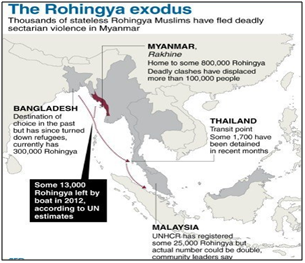

Context
India’s approach towards refugees, in general about the Rohingyas has raised several questions about India’s policy on the Rohingyas.
Background
- India allowed Rohingya refugees to enter the country in 2012 and considered the eruption of violent conflicts between Rakhine Buddhists and Rohingya Muslims in Rakhine State as an “internal affair”.
- Myanmar has classified them as “resident foreigners” or “associate citizens”. They were forced to leave Myanmar in large numbers after several waves of violence, which first began in 2012.
- Officially, about 1,200 Rohingya have been identified as among the first batch to have arrived in Delhi in 2012.

Analysis
Who are Rohingya?
- The Rohingya people are a stateless Indo-Aryan ethnic group who predominantly follow Islam and reside in Rakhine State, Myanmar (previously known as Burma).
- Rohingyas are prescribed by the United Nations as the most persecuted minority in the world.
- They fled their homes in 2017 to escape an alleged crackdown by Myanmar’s military.
- To escape discrimination and violence in Myanmar, minority Rohingya Muslims have for decades fled from the Buddhist-majority country to neighbouring Bangladesh and other countries, including India.
What is the issue?
- In June 2021, a fire ravaged one of the Rohingya camps, and after the incident displaced Rohingya were moved to an empty plot nearby that belonged to the Zakat Foundation of India, an NGO.
- It was later decided by the Delhi government to shift all Rohingya families to EWS flats and would be put under constant police watch.
Nature of assistance provided to Rohingyas in the detention camps:
- Relief assistance is provided by the Centre that includes monthly cash dole, subsidized ration, clothing materials, utensils, cremation and shradh (last rites) grants, and infrastructure facilities in camps.
What is India’s stand on refugees?
- According to the government the infiltration from the Rakhine State of Myanmar into the Indian Territory, besides being a burden on the limited resources of the country also aggravates the security challenges posed to the country.
- In addition, the rise in terrorism in the last few decades is a cause for concern in most nations and those illegal migrants are more vulnerable to getting recruited by terrorist organizations.
- India is not a signatory to the 1951 UN Convention relating to the Status of Refugees and the 1967 Protocol.
|
Foreigners Regional Registration Office (FRRO) is responsible for tracking foreigners and their visas. The FRRO is under the administrative control of the MHA. Since Delhi is a Union Territory, law and order are under the Central government, it has erupted the matter of managing the refugee issues pertaining to Rohingyas is between the Delhi Government and the Central Government. |
- All foreign undocumented nationals are governed as per the provisions of:
- The Foreigners Act, 1946
- The Registration of Foreigners Act, 1939
- The Passport (Entry into India) Act, 1920
- The Citizenship Act, of 1955
- Foreign nationals who enter the country without valid travel documents are treated as illegal immigrants.
- There is no national law on refugees at present. Only Standard Operating Procedures are issued by the MHA to deal with foreign nationals in India, who claim to be refugees.
|
The citizenship issue
|
What can be done further to improve their conditions?
- Making for them sustainable living conditions: In order to minimize the risk of disease and infection, large-scale vaccination programs have been launched to try to minimize the risk of disease.
- Legal and Social backing: By legislating a universal or national law on Refugees can help a lot in their management.
- Improved facilities: To improve sanitation and public health conditions with better employment opportunities.
Conclusion
India doesn't have a National Law on refugees at present and it was made clear by Mr. Rijiju (Minister of Law and Justice) in an address to the Lok Sabha. It is creating a vacuum, leaving enough legroom for political parties to turn the issue into a politicized one.
Given the importance of India’s internal security, the issue of refugees require immediate attention as any reconciliation procession takes time. Ironically, there is no enthusiasm to frame a refugee policy, this must change to adopt a non-discriminatory refugee policy.


